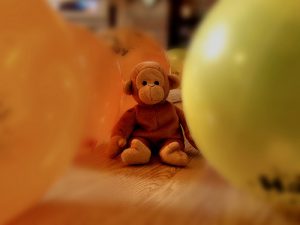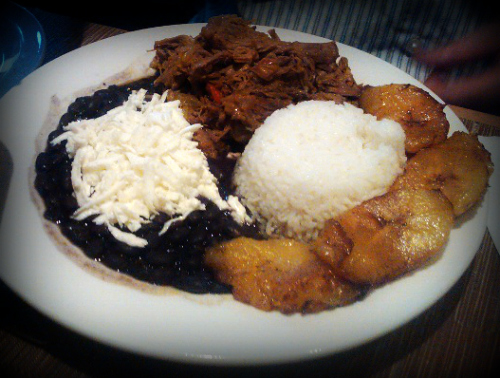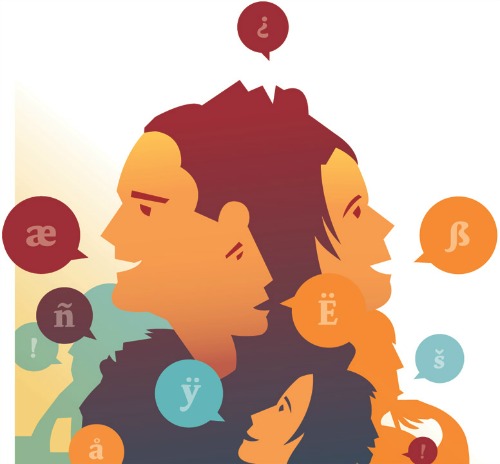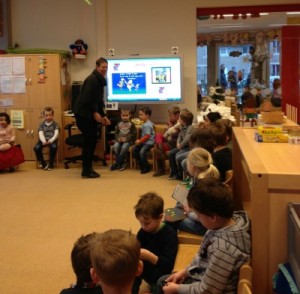
by World Moms Blog | Nov 25, 2013 | 2013, Body Image, Child Care, Childhood, Communication, Cultural Differences, Education, Eye on Culture, Family, Guest Post, Kids, Language, Life Balance, Motherhood, Parenting, Preschool, Relationships, School, Sex, Sexuality, Traditions, Uncategorized, Women's Rights, World Events, World Interviews, World Mom Feature, World Moms Blog, World Motherhood, Younger Children
 My neighbours in the Netherlands just had a baby and have proudly decorated their window with pink balloons and a garland saying: ”Hooray, a girl!”
My neighbours in the Netherlands just had a baby and have proudly decorated their window with pink balloons and a garland saying: ”Hooray, a girl!”
This would probably be shocking to a new category of Swedish parents, who refuse to reveal the sex of their baby to family and friends as well as to daycare staff. The baby is given a gender-neutral name, and will be dressed in anything but pink and light-blue.
Why? The parents don’t want their child to be subjected to society’s division of human beings into male and female, claiming that the stereotypes linked to it limit the child’s freedom.
While this remains rather rare, there is a rapidly increasing number of preschools in Sweden where gender equality is the main ideological and educational basis.
In these schools, the staff strives to treat girls and boys equally in all respects. They don’t hide the fact that both sexes exist, but don’t make a point of it and won’t encourage the children to play and behave in a way that is typical for their sex. They won’t call them girls and boys, but refer to them as ”friends” or ”children”.
Conveniently enough, a new pronoun is making its way into the Swedish language: ”hen”, meaning both ”he” and ”she” (”han” and ”hon” in Swedish). When the practice of using ”he” for both sexes in law texts was changed to the more cumbersome ”he or she”, texts became difficult to read and people started looking for other solutions.
The idea of ”hen” comes from the Finnish language (although Finnish is completely different from Swedish; its closest relative among European languages is Hungarian), which uses the pronoun ”hän” for both sexes. Apart from being used in texts to increase readability, the Swedish pronoun ”hen” is now used by advocates of gender neutrality.
The new pronoun and gender-neutral preschools are hot topics in Sweden right now. An increasing number of people like and make use of them, but a big part of the population is very critical towards them.
Sweden is one of the leading countries when it comes to gender equality. Thanks to the important work that has been done in this regard, women and men now basically have the same opportunities in all areas of life.
When gender equality turns into gender neutrality, however, are we still going in the right direction? Isn’t there a risk that gender-neutral treatment introduces another type of prejudice? When girls behave in a traditionally girly way, and boys behave in a traditionally boyish manner, will this be happily accepted or will they feel that their behaviour is wrong? Will there be a new ideal of tough girls and soft boys, as some critics fear?
How will children develop when their parents actively try to conceal what sex they are? Will they think that it’s bad to be a boy or a girl? Will they revolt against their upbringing and shower their own daughters with princess stuff, and their sons with cars and toy guns? Or will these children simply be freer and more unprejudiced than those who grow up in more traditional families, and contribute to a positive change in society?
Time will show.
What are you thoughts on this modern, Swedish approach to gender equality?
Kristina was born in Hamburg, Germany, but moved to Sweden at the age of 8 (her mother is German, her father Swedish). She studied French and linguistics and works as a translator. At the moment she lives in the Netherlands with her French husband and their two daughters, aged 17 months and 4 years. Kristina is interested in psychology and right now particularly focuses on child and family psychology. Working three days a week and being a full-time mom the remaining days, she doesn’t find as much time to read, write and practice yoga and music as she would like, but appreciates her early mornings in trains. There is nothing like contemplating an awakening landscape from a train with a cup of hot chocolate.
The image used in this post is credited to Jonathan Stonehouse. It holds a Flickr Creative Commons attribution license.
World Moms Blog is an award winning website which writes from over 30 countries on the topics of motherhood, culture, human rights and social good. Over 70 international contributors share their stories from around the globe, bonded by the common thread of motherhood and wanting a better world for their children.
World Moms Blog was listed by Forbes Woman as one of the "Best 100 Websites for Women 2012 & 2013" and also called a "must read" by the NY Times Motherlode in 2013. Our Senior Editor in India, Purnima Ramakrishnan, was awarded the BlogHer International Activist Award in 2013.
More Posts

by hjunderway | Nov 18, 2013 | 2013, Bilingual, Cultural Differences, Culture, Education, Expat Life, Eye on Culture, France, International, Living Abroad, Milestones, Motherhood, Moving, Preschool, Relocating, School, Stress, Traditions, USA, Working Mother, World Moms Blog, World Motherhood, Younger Children
 The day I gave birth to my son, HJ, is a day I’ll never forget. Induction nightmare? Check. Post baby snuggles? Check. September 3rd birth date? Check.
The day I gave birth to my son, HJ, is a day I’ll never forget. Induction nightmare? Check. Post baby snuggles? Check. September 3rd birth date? Check.
Little did I know at the time how much my son’s birthday would impact his development and education but flash forward to 2013 and here I sit, faced with the first of many educational concerns.
Living in Paris meant that on September 4th, 2012, my son formally entered the French education system. At just three years old, he was invited to attend nursery school, or maternelle, which comprises the first three years of schooling. Due to his inability to speak French, my son was invited to attend school four mornings per week from 8:30 a.m. until 11:40 a.m. As he began to thrive in school, his teacher gently suggested that I begin leaving him for one full-day per week after the holiday break in December. By late-January, he was attending school all day until 4:15 p.m., eating French catered lunch in the cantine (cafeteria), enjoying rest time, and thriving.
Combining his easy going attitude and tall stature (95% percentile for height), most parents thought my son was one of the older kids in the class. In order to start school in September, children must turn three by December 31st, and with a September 3rd birthday, my son was one of the younger students. When I would share this with the parents, they’d say, “Wow, but he is so tall!”
Our plans for HJ’s education were that he would be in French school until we moved home, and at that point he’d transition into kindergarten at the local school. When our contract ended sooner than expected, I began the joyous task of figuring out what options we had to continue HJ’s formal education, and the results were shocking.
HJ misses the US cut-off for kindergarten by two days. This means that he has to wait until he is six to enter kindergarten! I neatly placed that reality aside and instead focused on what education he could receive now, at four years old.
My choices floored me.
Option A) the public school offers a “lottery” for kids ages 3-4 for preschool, and the schedule only allows kids to get one of three spots: two mornings from 8-11, three mornings, four afternoons, or five mornings. And all this for the staggering price of more than $6,000.
Option B) the local Montessori school, which has no openings until September of 2014, and again runs mornings only. Did I mention that they also refused to reveal the actual cost of the program?
And finally, Option C) a local Catholic school that offers five all-day classes for around $7,000.
So what’s the big deal?!
Children in France have access to all-day education beginning at age three for FREE, with master’s degree trained teachers. While every school isn’t as amazing as the one my son attends, the French may be on to something. For two working parents, morning-only, formal education settings are an inconvenience, and for single-income families, shelling out over $6,000 for a few hours a day may be too much.
All around the United States, parents are struggling with making hard financial decisions and I wonder if it seems fair that we have to do so when it comes to our children’s educations?
For us, having HJ evaluated and exploring how he measures up to his peers is one solution. How he falls in the range of social and emotional intelligence will give us a window into how he may fair in kindergarten and will be necessary if we plan on fighting the school district for a spot in kindergarten if it seems logical and appropriate for our son.
The second option is to just ride the wave and instead allow our six year old to join his peers, perhaps giving him a leg up on his classmates. Then I question, “Will he be bored?” “Too big?” At this point I’m just not sure which choice is best for our little guy but it did get my wheels moving, wondering about the significant differences in how each country approaches education. What is it like for children in Germany, or Canada? Do parents struggle with similar issues in Sydney, Australia?
So please, World Moms Blog readers, share your location/country’s educational process! When does school begin? When did your children start school? Anything you wish you could change about your child’s educational experiences?
This is an original post to World Moms Blog from Jacki, mother of one now living in XXX but formerly blogging from Paris, France.
Jacki, or “MommaExpat,” as she’s known in the Internet community, is a former family therapist turned stay-at-home mom in Paris, France. Jacki is passionate about issues as they relate to mothers and children on both domestic and international scenes, and is a Volunteer Ambassador for the Fistula Foundation. In addition to training for her first half marathon, Jacki can be found learning French in Paris and researching her next big trip. Jacki blogs at H J Underway, a chronicle of her daily life as a non-French speaking mom in France.
More Posts

by Eva Fannon (USA) | Oct 4, 2013 | Cultural Differences, Culture, Eva Fannon, Eye on Culture, Holiday, Language, Multicultural, World Motherhood

Typical plate in Venezuela: caraotas (black beans) con queso blanco (cheese), platano maduros (ripe fried plantains), arroz (rice) and ropa vieja (stewed beef).
Stranger: “So, where are you from?”
Me: “Well, I was born in NY, but my family moved to NJ around the time I was 11 or so.”
Stranger: “No, I mean what are you?”
Me: “Huh?” (As I think to myself…a person, a female, a mom.)
Stranger: “Like, what country are you from?”
Me: (Thinking to myself….what part of ‘I was born in NY and then moved to NJ’ didn’t you understand?!) (more…)
Eva Fannon is a working mom who lives in the beautiful Pacific Northwest with her hubby and two girls. She was born and raised on the east coast and followed her husband out west when he got a job offer that he couldn't refuse. Eva has always been a planner, so it took her a while to accept that no matter how much you plan and prepare, being a mom means a new and different state of "normal".
Despite the craziness on most weekday mornings (getting a family of four out the door in time for work and school is no easy task!), she wouldn't trade being a mother for anything in the world. She and her husband are working on introducing the girls to the things they love - travel, the great outdoors, and enjoying time with family and friends. Eva can be found on Twitter @evafannon.
More Posts - Website
Follow Me:




by Salma (Canada) | May 24, 2013 | Bilingual, Canada, Communication, Culture, Education, Family, Kids, Language, Motherhood, Multicultural, Parenting, Salma, World Motherhood, Younger Children

I am trying to teach my youngest child three languages. I am determined to make it work, even if I only speak one perfectly. I am making a conscious decision to do something that is almost as awful as pulling teeth (in my opinion). I am determined to force myself to come out of my comfort zone, even if it means being laughed at; yes, it happens sometimes. My attempts to teach my young child English, Arabic and French were inevitably a disaster waiting to happen, except that it happened right away. It is a deliberate act of madness on my part, and I hope that my son makes it out alive.
Here’s a little background on my adventures. I have always been a passive bilingual. In my case, I understand spoken French (mostly), I understand written French (greatly), and I can speak some French. The problem is, as the years go by, my linguistic ability coupled with my self-confidence dwindles. And boy is it ever complicated! Along with my love for French, I found it necessary to study and learn Arabic – I married an Arabic speaker. Sure, he speaks English, but my mother-in-law doesn’t speak more than ten words of English.
Learning a new language in your late 20’s is something different. I have always respected immigrants who move to new countries and learn the language (through no choice of their own of course), but now I respect them ten-fold. (more…)

An Imperfect Stepford Wife is what Salma describes herself as because she simply cannot get it right. She loves decorating, travelling, parenting,learning, writing, reading and cooking, She also delights in all things mischievous, simply because it drives her hubby crazy.
Salma has 2 daughters and a baby boy. The death of her first son in 2009 was very difficult, however, after the birth of her Rainbow baby in 2010 (one day after her birthday) she has made a commitment to laugh more and channel the innocence of youth through her children. She has blogged about her loss, her pregnancy with Rainbow, and Islamic life.
After relocating to Alberta with her husband in 2011 she has found new challenges and rewards- like buying their first house, and finding a rewarding career.
Her roots are tied to Jamaica, while her hubby is from Yemen. Their routes, however, have led them to Egypt and Canada, which is most interesting because their lives are filled with cultural and language barriers. Even though she earned a degree in Criminology, Salma's true passion is Social Work. She truly appreciates the beauty of the human race. She writes critical essays on topics such as feminism and the law, cultural relativity and the role of women in Islam and "the veil".
Salma works full-time, however, she believes that unless the imagination of a child is nourished, it will go to waste. She follows the philosophy of un-schooling and always finds time to teach and explore with her children. From this stance, she pushes her children to be passionate about every aspect of life, and to strive to be life-long learners and teachers. You can read about her at Chasing Rainbow.
More Posts - Website

by hjunderway | May 20, 2013 | Being Thankful, Child Care, Childhood, Cultural Differences, Education, Expat Life, Family, France, International, Language, Life Lesson, Living Abroad, Motherhood, Multicultural, Parenting, Preschool, Relocating, World Motherhood, Younger Children
 Looking back to my pregnancy as an almost mom to my one and only son, I literally had everything prepared for the first nine months of his life before his eyes ever saw the outside world.
Looking back to my pregnancy as an almost mom to my one and only son, I literally had everything prepared for the first nine months of his life before his eyes ever saw the outside world.
Diapers and clothing gently washed and neatly lined up by size, ready for each growth spurt, each passage from newborn to infant and beyond. I bought “What to Expect….” for the first three years of his existence, pouring over every detail and mentally preparing myself for each developmental stage. I was ready for it all.
My planning served me well for the first three years of my son’s life, and then we up and decided to move to a foreign country. The “What to Expect” books were packed away in long-term storage in the United States, and along with it, my sense of direction as a mother.
We have spent the last year attempting to navigate our way through life in France when French isn’t your primary language, when there aren’t any grandparents to lend a hand, and when all that is familiar becomes a distant dream.
When we arrived in France, my son was 2 years, five months and together we plowed through understanding new social norms, French cuisine, and more recently, the education system.
We did this without a manual, and did okay without it. There were times when I just wanted to type in “raising an American boy in Paris” in Google to look for tips and clarity on what we were doing wrong (or right). If there had been a manual or how-to book, I would have read it 1,000 times and given copies to all of my new expatriate friends with children.
I wasn’t sure that we were doing right by our son when we entered him into a French school at age three (standard practice in France), when the teachers and students couldn’t even pronounce his name correctly. I wasn’t sure that we were doing it right when potty training took a huge deviation and we faced mounting laundry that took forever to dry on racks in our living room.
I know I wasn’t sure that we had done right by our son when he had a meltdown at a friend’s playgroup,hitting and kicking anyone and everyone who came into his path. When I had to pack him up early and head home, I may have had a meltdown myself. Again and again, I was looking for grand gestures in my son’s behavior as proof that he was adjusting appropriately to living in a new country, and I couldn’t find any.
Why do we always look for the grand gestures? Without a guide, we often get caught up looking for the big things and forgetting to spot the small ones.
For example, at 6 months of age, I knew that my son wasn’t able to crawl because he hadn’t developed enough upper body strength to support his head, which was off the charts developmentally. I knew this because the books and doctors told me so, and therefore I had an appropriate course of action to get him back on track. Having a guide instilled in me a parenting confidence that I knew my son and that we were doing everything right, but by whose standards?
Now, a year later and closer to preschool age than that of toddler, I find myself discovering more and more of the small indications that my little one is doing just fine transitioning in our new life abroad. I see it when my son doesn’t realize I’m watching and instead of saying, “Look, look!” with excitement, he yells out, “Regarde, regarde!” (Look in French.)
I see it when he stops to hug a strange toddler crying in the playground, or when he asks me if we can take an airplane home to see his grandparents and cousin. I see it when he takes my hand to cross the street but instead of letting go immediately, he gently slides his thumb repeatedly across my knuckles, something I’ve done to him a thousand times. As time goes on, he becomes more and more self-assured and more at home being who he is. And no manual could have prepared me for that.
Has there been a time when a manual or how-to book couldn’t help you effectively parent your child through a unique situation?
This is an original post to World Moms Blog by Jacki, an American expatriate mother living in Paris, France.
The image used in this post is credited to the author
Jacki, or “MommaExpat,” as she’s known in the Internet community, is a former family therapist turned stay-at-home mom in Paris, France. Jacki is passionate about issues as they relate to mothers and children on both domestic and international scenes, and is a Volunteer Ambassador for the Fistula Foundation. In addition to training for her first half marathon, Jacki can be found learning French in Paris and researching her next big trip. Jacki blogs at H J Underway, a chronicle of her daily life as a non-French speaking mom in France.
More Posts
by World Moms Blog | Apr 8, 2013 | Cultural Differences, Education, Guest Post, International, Language, Living Abroad, Motherhood, Multicultural, Preschool, Siblings, Twins, World Motherhood, Younger Children

Brody’s first day of school in the Netherlands.
There are things in life that I have never found intimidating. Specifically with my own education. I come from a family where I was the first to go on to college and eventually graduate. I filled out my paperwork, I applied for student loans, and I made sure that everything I had to do was taken care of, either in person (waiting outside of the counselor’s office for hours on end) or through mindless games of guess-that-phone-extension with the registrar. My parents didn’t know how to help me and that was OK.
In light of this over self-confidence when it came to taking care of myself and my education- I never thought much about the education of my children. Back in the States my oldest started a toddler program two years ago- three days a week for a couple of hours just so that his new twin brothers and I didn’t suck the life out of him. Finding the right school (easy, it was a friend’s suggestion), enrolling, and becoming a part of the program was no big thing.
In essence- everything has been easy with regard to early education up until now. My family and I moved from South Carolina to The Netherlands in November of last year. I wasn’t in a ‘rush’ per say, to get the boys into a preschool program, but I feared expat isolation, lack of friends and exposure to their new culture.
When we went house hunting, our biggest concern was what kind of schools were in the area. It had to be very close to home (walking distance) and they had to welcome us. Outsiders. Americans in this small Netherlands village. (more…)
World Moms Blog is an award winning website which writes from over 30 countries on the topics of motherhood, culture, human rights and social good. Over 70 international contributors share their stories from around the globe, bonded by the common thread of motherhood and wanting a better world for their children.
World Moms Blog was listed by Forbes Woman as one of the "Best 100 Websites for Women 2012 & 2013" and also called a "must read" by the NY Times Motherlode in 2013. Our Senior Editor in India, Purnima Ramakrishnan, was awarded the BlogHer International Activist Award in 2013.
More Posts

 My neighbours in the Netherlands just had a baby and have proudly decorated their window with pink balloons and a garland saying: ”Hooray, a girl!”
My neighbours in the Netherlands just had a baby and have proudly decorated their window with pink balloons and a garland saying: ”Hooray, a girl!”















